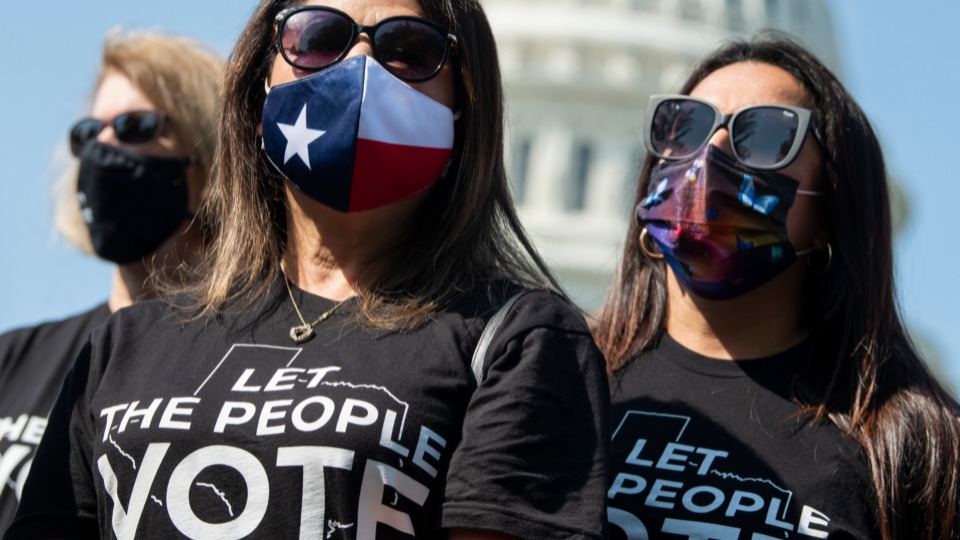
The ink from Texas Gov. Greg Abbott’s pen approving a new voter repression law didn’t even have time to dry Tuesday before a massive coalition filed suit to overturn this latest racist Republican attempt to block people from casting ballots.
Immediately after Abbott signed the bill, officially designated SB 1, a joint case was filed in federal court by Voto Latino, LULAC Texas, the Texas Alliance for Retired Americans, and the state organization of the American Federation of Teachers. Together, the four groups represent millions of Texans.
Texas already had some of the nation’s most restrictive voting laws even before Republicans in the state legislature rammed through SB 1. Contrary to claims by Abbott and the GOP that the law will make it easier to vote, elections experts and voting rights advocates point out that it does the exact opposite. And they’ve noted the ways that SB 1 targets voters of color for particular restrictions in an effort to shut out those more likely to vote Democratic.
With SB 1 becoming law, Texas is at least the 18th state to enact new restrictions on voting since the 2020 election, according to the Brennan Center for Justice. Republicans in several states—Florida, Georgia, Arizona, and others—used former White House occupant Donald Trump’s false claims of election fraud as the rationale for these fresh attacks on democracy.
Those fighting to expand voting rights slam the narrative that there is any widespread voter fraud or a need for legislation to combat it.

“Instead of celebrating record turnout in 2020, in an election that the GOP-led government certified as fair and legitimate, Republicans are now pushing bogus claims about voting fraud to justify restrictive voter suppression laws,” Maria Teresa Kumar, the head of Voto Latino, said on Tuesday.
“These laws are in direct conflict with our Constitutional rights of free, fair, equitable access to the voting booth,” she explained, arguing that SB 1 is “an arduous law designed to limit Tejanos’ ability to exercise their full citizenship.”
Derrick Johnson, president of the NAACP, which filed an earlier lawsuit, was blunt in his assessment: “Black votes were suppressed today. Texas Gov. Greg Abbott has intentionally signed away democracy for so many. We are disgusted.”
SB 1 is part of a concerted effort by Republicans to lock Texas into the GOP column in the face of demographic and political changes that suggest the days of right-wing control of the state’s Electoral College votes could be numbered. In advance of the 2022 and 2024 elections, Republicans are instituting a hard-right agenda to fire up their base—as evidenced by last week’s new abortion restrictions—and voter suppression to keep Democratic-leaning voters and voters of color away from the ballot box.
To achieve that goal, SB 1 institutes a range of suppression tactics, some of which copy old tried-and-true methods and others which are new.
It will empower political party-appointed “poll watchers” to observe voters at their polling place and challenge their right to vote. Texas, along with several states, have long histories of using so-called “poll watchers” to block Black and Latino voters from exercising their rights. In the past, the Ku Klux Klan and white supremacist poll monitors used violence and the threat of it to do the same.
Aimed at intimidating voters
Such practices today are still aimed at intimidating voters, especially in districts with a majority of minority voters or in Democratic districts in general. Republican poll watchers—both official and vigilante ones—were part of the Trump voter fraud scam in 2020. They often showed up with Trump flags and were sometimes heavily armed. The goal was to dissuade voters and put pressure on ballot counters and elections officials. Under SB 1, poll watchers are granted “free movement” throughout polling places.
Texas Republicans are also explicitly reversing all the measures that have been taken in some counties—especially Democratic-run ones—to make it easier to vote. Ballot drop boxes, which have been used across the country for years with no security issues, are now banned. Further, elections officials are prohibited from sending absentee applications and ballots to all eligible voters—measures which during the worst days of the COVID-19 pandemic last year kept people from crowding into polling places.
Drive-thru voting is permanently outlawed for most voters, and voting hours are to be tightly controlled. Innovations like Harris County’s 24-hour voting locations are made illegal. They had allowed working-class, young, and ill voters to access the polls outside of normal business hours. Harris County, home to the city of Houston, is one of the nation’s largest and most racially diverse areas, and over 140,000 voters there used the drive-thru and 24-hour locations last November.
Voting by mail—another democracy lifeline during COVID-19 and for seniors in every election—will be made more difficult. Voters will be forced to jump more hurdles to send their ballot through the mail, with several additional documents and forms required. With the inclusion of more steps in the process, Republicans in Texas—like those in Georgia, who were first to implement such measures—hope to create more opportunities for voters to make small mistakes and thus create more opportunities to throw away invalid ballots.
“Older people take the right to vote seriously, and this law will make it much more difficult for Texas seniors to exercise their constitutional right to vote,” Gene Lantz, president of the Texas Alliance for Retired Americans, said of the mail blockade. “Seniors rely on early voting and mail ballots to vote without standing in long lines on Election Day,” Lantz said.
“Many older Texans also have physical limitations and may decide not to vote out of fear of intimidation or harassment at the polls. This law is an affront to democracy, and we are suing to make sure everyone’s voices are heard at the ballot box,” he told the press.
There are also new criminal penalties for the essentially non-existent problem of voter fraud and restrictions on helping people fill out or read their ballot. There was an attempt by the GOP to mandate prosecution for people with criminal records who vote without knowing they’re ineligible, but it was pulled at the last minute after the prosecution of two Black voters made the racist nature of the restriction too apparent.

The road to finalizing SB 1 was a long one, but Republicans were ruthless in making sure it became law. For 38 days, more than 50 Democratic lawmakers had kept in gridlock status by fleeing the state and denying the GOP a quorum in the legislature. But Abbott threatened to arrest the Democrats and lock them in the state capitol until they voted on the law. Texas Democrats didn’t have the votes to stop the bill in the end, but the delay they caused allowed time for opponents of SB 1 to prepare legal challenges.
“This law is part of a dangerous, coordinated national campaign to keep millions of Americans from voting,” said Richard Fiesta, executive director of the Alliance for Retired Americans. His organization was among those that filed suit Tuesday.
The head of another party to the case, Zeph Capo of the Texas AFT, trashed GOP lawmakers for subverting democracy and setting a bad example for young people in the state. “This law is an embarrassment, one that students will see as taking us backward to a time when many voices and their votes were repressed,” Capo said.
It won’t be democracy and racial equality alone which suffer as a result of SB 1, though. Economists are predicting that enacting voter suppression legislation will be bad for the economy and jobs in Texas, too. Georgia’s earlier anti-voter laws led to the cancellation of some previously-announced investments in the state and earned the condemnation of several corporations who were pressured by consumers and employees to denounce the moves.
Recent analysis suggests the impact to Texas in lost revenue from tourism and economic development could amount to as much as $17 billion. By 2025, it may also mean the loss of as many as 150,000 jobs.

MOST POPULAR TODAY

Zionist organizations leading campaign to stop ceasefire resolutions in D.C. area


High Court essentially bans demonstrations, freedom of assembly in Deep South

Afghanistan’s socialist years: The promising future killed off by U.S. imperialism

Communist Karol Cariola elected president of Chile’s legislature






Comments